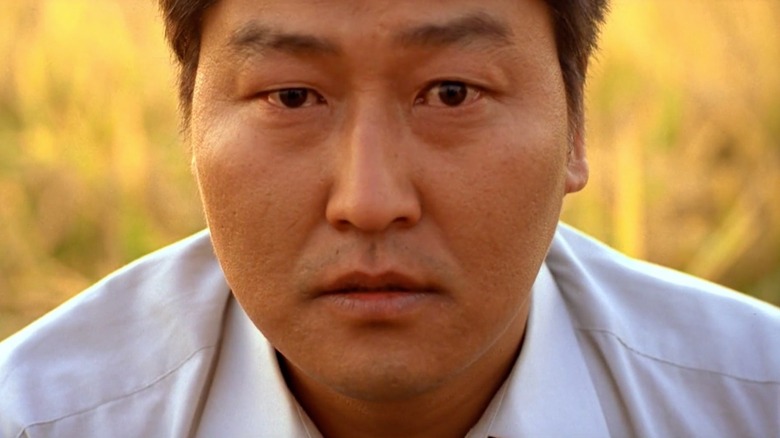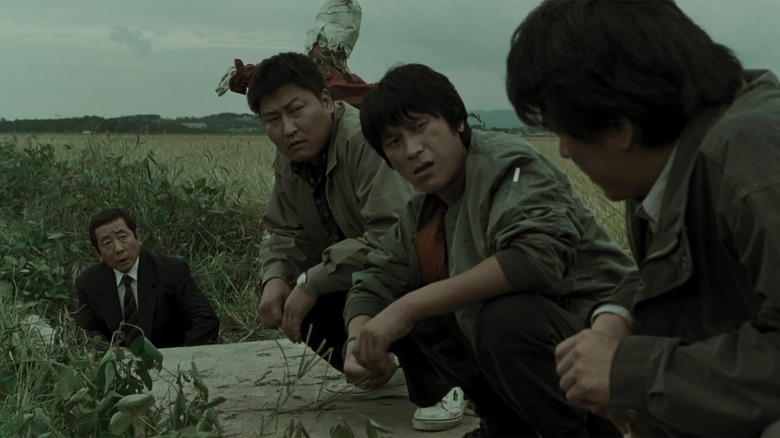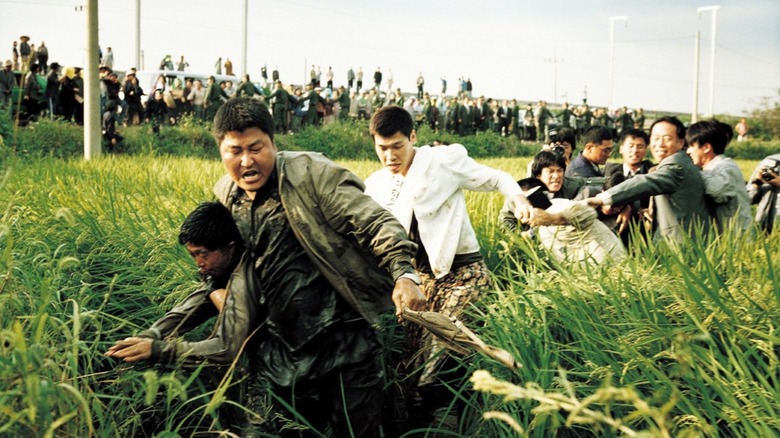One Of The Greatest Serial Killer Movies Ever Is Based On A True Story
Before writer and director Bong Joon-ho won the Palme d'Or and swept the Academy Awards with his genre-bending class war masterpiece of Korean cinema, "Parasite," he had created one of the most chilling serial killer movies of all time with "Memories of Murder." The film follows two detectives, one a local of a small Korean town (Bong's frequent collaborator Song Kang-ho) who follows his gut instincts and the other is a more clinical investigator from the big city of Seoul (Kim Sang-kyung), as they investigate a series of horrific rapes and murders in a remote part of South Korea.
The true crime genre is crowded with films that flatten and simplify the investigative process to produce a pat, happy ending. That is why "Memories of Murder" stands out as one of the rare films to acknowledge how little we truly understand about the evil lurking in the darkness. It bears all the hallmarks of director Bong's style, from his meticulously crafted cinematography and unique blending of comedy and horror, which is why it's not just one of the scariest serial killer movies of all time but also one of the best thrillers of the 21st century, period.
But the legacy of the film isn't just its status as an official member of the Criterion Collection. It's also based on a true story, the narrative of which has changed drastically in the 20 years since its release.
The real case that inspired 'Memories of Murder' was unsolved until 2019
The true story that inspired "Memories of Murder" begins in 1986, when the small village of Hwaseong was struck by a string of sexual assaults and murders of women all throughout the town. Over the course of five years, 10 women were killed, from school girls to elderly women, and the town was struck with panic.
Without modern technology like blood tests and surveillance cameras to assist in the case, the South Korean police had difficulty finding any leads in the case, and in this rural town without street lights, the people were overrun with fear and paranoia. The years dragged on, and with their exhaustive efforts failing to produce any results, a local repairman was arrested and confessed to one of the murders. The police didn't believe he was the actual serial killer, alleging that he was a copycat, a tacit acknowledgment by authorities that the case would remain unsolved for the foreseeable future.
That is where the story of "Memories of Murder" picks up, adapting the story of the small village attacked by a serial killer, retaining the mysterious individual's choice of victims while fictionalizing the actual people involved. By the time the credits roll on the film, the detectives have made next to no progress on actually finding the killer, and all the men involved are wracked with guilt that they've failed to keep their community safe. It's tragic and haunting, but 16 years after the film premiered to rave reviews, the story took a dramatic turn when the police announced that, after all these years, they'd found the real killer, and he turned out to be right under their noses the entire time.
Real life is often stranger than fiction, according to the killer himself
For over three decades, the killer was known only as "the Hwaseong Murderer," but in 2019, the police were able to put a face and a name to the man responsible: Lee Choon-jae. Thanks to forensic evidence, police were able to identify Lee as the killer, at which point he confessed to not just the 10 original killings but four more murders that were previously not thought to be connected.
At the age of 57, Lee was already in prison for a life sentence for the murder and rape of his then-18-year-old sister-in-law at the time he made his confession. You might think this conviction should have been an obvious connection to the Hwaseong murders, and Lee agrees, telling CNN:
"I still don't understand [why I wasn't a suspect.] Crimes happened around me and I didn't try hard to hide things so I thought I would get caught easily. There were hundreds of police forces. I bumped into detectives all the time but they always asked me about people around me."
This police misconduct is a central element of "Memories of Murder," which depicts the cops as largely incompetent in their investigation, prone to dropkicking a suspect when they're all out of ideas.
For his part, Bong Joon-ho has not said much about the traumatic incident at the heart of one of his most famous films. He was asked to share his thoughts at a pre-release screening of "Parasite" in Los Angeles (via the L.A. Times), in which he spoke about how the ambiguity of the killer's face was at the top of his mind while making the movie:
"When I made the film, I was very curious, and I also thought a lot about this murderer. I wondered what he looks like. The only one who I could not meet was, of course, the murderer."
Bong went on to applaud the police for their "endless effort to find the culprit." But even now that the case has been solved, the lingering fear and doubt remain, both for the people of South Korea who endured years of horrific murder, and the audiences who revisit "Memories of Murder," reminded of just how fragile our lives really are.


